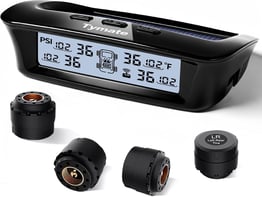

Maintaining the correct tire pressure and monitoring tire temperature are crucial for the safety, efficiency, and longevity of your travel trailer. These factors not only influence your trailer’s handling and braking but also play a significant role in preventing tire blowouts, improving fuel efficiency, and ensuring a smooth ride. Here's an in-depth look at the importance of tire pressure and temperature for travel trailers, and tips on how to monitor and maintain them.
Importance of Tire Pressure and Temperature
Tire Pressure
Safety: Underinflated or overinflated tires can lead to reduced control over the trailer, especially at high speeds or during sharp turns. Improper tire pressure can lead to tire blowouts, which are dangerous, especially while towing a trailer.
Fuel Efficiency: Tires with proper inflation create less rolling resistance, improving fuel efficiency. Low-pressure tires cause more friction, reducing fuel economy and increasing tire wear.
Tire Longevity: Properly inflated tires wear more evenly, which extends their lifespan. Overinflated tires are more susceptible to damage from road debris, while underinflated tires can overheat and wear unevenly.
Handling and Comfort: Proper tire pressure ensures smoother handling and ride quality, preventing the trailer from swaying or fishtailing.
Tire Temperature
Overheating Risks: Tires can heat up during long trips, especially under heavy loads. Excessive heat can cause tire failure, and tires that run hotter than normal are more prone to blowouts.
Pressure and Temperature Link: Tire pressure and temperature are closely linked. A tire with low pressure will generate more heat as the tire flexes more under load. On the other hand, an overinflated tire will have a reduced contact patch with the road, leading to increased friction and heat.
Ideal Tire Pressure for Travel Trailers
The correct tire pressure varies based on the tire size, load capacity, and manufacturer recommendations. Always refer to the vehicle’s owner manual or the tire sidewall for the manufacturer-recommended tire pressure. However, general guidelines for tire pressure for travel trailers are as follows:
Lightweight Travel Trailers: 50-65 psi (pounds per square inch)
Heavier Travel Trailers and Fifth Wheels: 80-100 psi
Tires for Dual Axle Trailers: Typically, 65-80 psi, depending on the load and tire specifications.
How to Check Tire Pressure
Use a Tire Pressure Gauge: Always check tire pressure when the tires are cold (i.e., before driving or after the vehicle has been parked for a few hours). This provides an accurate reading.
Check Regularly: Perform tire pressure checks every 1-2 weeks and before long trips, or whenever you notice unusual handling or tire wear.
Use a TPMS (Tire Pressure Monitoring System): A TPMS, which is integrated into your travel trailer, provides real-time monitoring of tire pressures, alerting you to low or high pressure during the trip.
Have an air compressor. Make sure that is goes as high as you need for your specific tires.
Tire Temperature Monitoring
While monitoring tire pressure is important, keeping an eye on tire temperature is also crucial, especially for long trips or heavy loads.
Ideal Temperature Range: The ideal tire temperature should typically be between 120°F and 160°F (49°C to 71°C). Temperatures exceeding 200°F (93°C) can indicate excessive heat buildup and could lead to tire damage or blowout.
Heat Build-Up: Long trips, especially when towing heavy loads, can cause tires to overheat. This is especially a risk for trailers that aren’t properly balanced or when tires are underinflated, as they generate more friction.
High-Temperature Alerts: Tires that are too hot can fail suddenly. A TPMS that includes temperature monitoring will alert you when tire temperature is approaching dangerous levels, allowing you to take corrective action before a blowout occurs.
Maintaining Proper Tire Pressure and Temperature
1. Use the Right Tires for Your Trailer
Choose tires rated for your trailer's weight and intended use. ST (Special Trailer) tires are designed for towing and will provide the best performance and durability for your travel trailer.
Consider the tire's load rating, speed rating, and max pressure. Make sure the tires are properly matched to your trailer’s load and size.
2. Regularly Inspect Tires
Visual Inspections: Check your tires for visible damage, such as cracks, punctures, or excessive wear. Look for signs of uneven wear, which could indicate misalignment or incorrect tire pressure.
Check Valve Stems: Make sure the valve stems are in good condition and free of debris. Leaking valve stems can cause pressure loss.
3. Avoid Overloading Your Trailer
Overloading your trailer can lead to excessive heat buildup in your tires, causing them to fail. Always stay within the trailer’s weight limits, including the weight of the cargo, water, and passengers.
Load Distribution: Make sure the weight is evenly distributed across the trailer. Uneven weight distribution can cause one or more tires to carry more load than others, leading to excessive pressure and heat buildup in those tires.
4. Keep Your Tires Balanced and Aligned
Improper tire balance or alignment can cause uneven tire wear and excessive heat buildup. If you notice any unusual vibration or handling issues, have your tires balanced and aligned by a professional.
Tire Rotation: Rotating your tires regularly can help ensure even wear, especially on tandem-axle trailers.
5. Inflate to Manufacturer Specifications
Always inflate your tires to the manufacturer’s recommended pressure. Do not exceed the maximum pressure listed on the sidewall of the tire, as overinflation can cause reduced tire contact with the road, increasing the risk of blowouts.
Adjust for Temperature Changes: Tire pressure decreases in colder temperatures and increases in warmer weather. Make adjustments accordingly to maintain the ideal pressure.
6. Use a TPMS System
A TPMS with temperature and pressure monitoring will alert you to any issues in real-time, which can help you address problems before they lead to a tire failure.
Tymate RV Tire Pressure Monitoring System - M12-3: This particular system was refereed to me by a seasoned camper, and it has been great so far.
Automatic solar charging
Five alarm modes (high pressure, low pressure, high temperature, rapid air leakage, sensor low battery alarm)
Backlit display
Very easy to use – just replace your valve stem caps with the sensors
Budget friendly
Maintaining the correct tire pressure and monitoring tire temperature are essential practices for safe towing and trailer performance. Proper tire pressure ensures safety, optimal fuel efficiency, and longevity, while monitoring temperature helps prevent overheating and blowouts. Use a reliable TPMS system that monitors both pressure and temperature to keep you informed about the health of your tires and avoid potential issues on the road. Regular inspections, proper tire care, and correct loading can further ensure your trailer’s tires perform optimally, keeping you safe and your travel experience worry-free.
Safe travels!
If you decide to purchase any of these items, please do so through my affiliate links by clicking on the item photo. This helps you and me. Amazon extends a small percentage to me with no cost to you. And, you get vetted products without having to take the time do the research. Thank you for your support!
